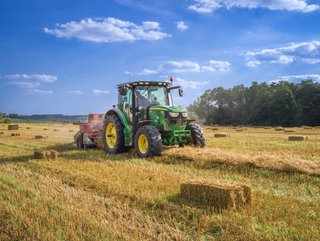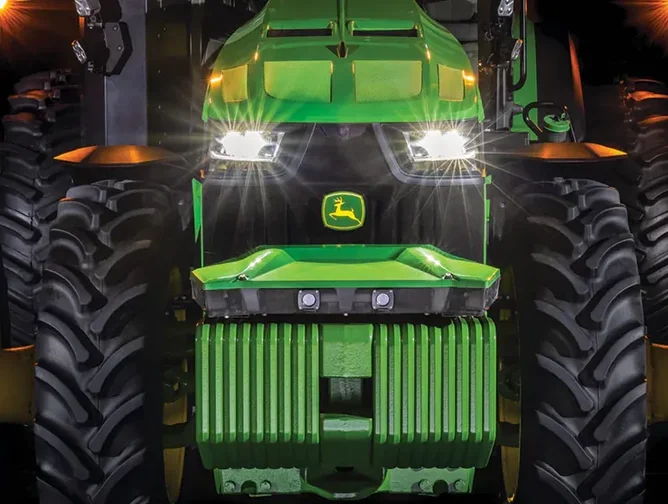John Deere Ploughs Sustainable Farming Forward with Cloud

John Deere is no stranger to securing awards.
As a global leader in the delivery of agricultural equipment, the US-headquartered company has landed numerous accolades over the year for its smart innovations – designed to improve sustainable agriculture and meet the world’s increasing demand for food.
Take the battery-electric backhoe that eliminates tailpipe emissions or the revolutionary sprayer (See & Spray Ultimate) that reduces herbicide use by more than two-thirds (2022).
In its latest award for sustainable innovation, the $10.166 billion annual revenue business has been named a CES 2024 Innovation Awards Honoree in the Sustainability, Eco-Design & Smart Energy category for the fifth consecutive year.
Recognising products that accelerate environmentally friendly behaviour, the prestigious award dealt a sizeable green nod to the technology behind John Deere’s new Operations Center Sustainability Tools.
Already delivering big on sustainable innovation with its autonomous tractors and fertiliser optimisation, the company has built on these technologies with the cloud to help make real-time decisions easier and more efficient for those running the more than 2 million farms across the US (and many more millions globally).
Forming part of Leap Ambitions, John Deere’s ambitious roadmap to sustainability, the company strategy is rooted in a commitment to help “customers become more efficient, profitable and sustainable while meeting the demands of a quickly changing world,” John Deere CEO John C. May said in the 2022 Sustainability Report.
Among sustainability goals, John Deere has pledged to deliver 1.5 million connected machines by 2026, to increase crop protection efficiency by 20%, and to reduce 15% of customer CO2 emissions by 2030.
John Deere believes it can have an impact beyond its own Scope 1, 2, and 3 CO2 emissions. Through precision technology, data-driven insights, and traceability enablement, the business can impact on-farm greenhouse gas (GHG) emissions, scaling the magnitude of its impact beyond its own footprint.
Which is where John Deere’s innovative technology solutions come in, including its award-winning Operations Center Sustainability Tools.
John Deere Cloud-Based Technology for Sustainable Management
The John Deere Operations Center is an opt-in cloud farm management system that lets farmers create efficient work plans, monitor the progress and success of different tasks, and receive insights from field data anywhere, at any time.
Farms using this system are known as ‘engaged acres’ and the goal is to increase engaged acres from 329 million in 2022 to 500 million by 2026 – with 75% of these sustainably engaged by 2030.
Using the cloud system, farmers can access insights, share data, and use more than 200 apps from other software companies to help them decide when to plant certain crops and how deep farmers should plant them based on previous data, for example.
With this data, farmers can create digital twins of their farms to see which crops can thrive, given their farm’s soil type and weather patterns.
“Farmers care deeply about their land and work to manage it sustainably because it’s their livelihood and their legacy,” says Jahmy Hindman, chief technology officer for John Deere.
Pointing to the platform’s new and award-winning Sustainability Tools, Hindman says these provide farmers “better visibility into their farming practices”.
They provide actionable and personalised insights into key aspects of their operations – including carbon intensity, soil health and fuel emissions – so farmers can understand the impact their decisions have on the sustainability of their operations and make smart decisions accordingly.
“Arable land is not an unlimited resource, and these new tools give farmers the ability to make informed decisions that not only benefit themselves, but the next generation of farmers and the world that relies upon them.”
Among sustainability-focused features, the platform enables farmers to enrol in voluntary revenue-generating programmes and further share the resulting insights with advisors.

Farmers Embrace Technology as Climate Challenges Rise
Demands on farmers have grown more challenging and complex in recent years.
Among these, the rising costs of fertilisers, pesticides, transportation and labour – as well as climate change (drought floods and other extreme weather), which has caused yields to fall.
Then there’s the very real challenge of food security. With the world’s population expected to exceed 10 billion by 2050, increasing global food demand by around 50%, farmers will need up food production by 60% to 70% to feed everyone, says John Deere.
Committed to addressing the growing challenges faced by farmers, John Deere is leveraging advanced technologies to not only optimise farming practices that enable farmers to make data-driven decisions based on weather patterns and crop health, but to deliver equipment and practices that promote sustainability in agriculture – everything from automation and robotics, renewable fuels and alternative power solutions to autonomous vehicles.
Among John Deere's innovative tech sustainability solutions:
- ExactShot – this leverages sensors and robotics to dispense a more precise amount of starter fertiliser required during the planting process. ExactShot’s built-in sensors know when a seed is being planted and will dispense the required amount of fertiliser – a system John Deere says could save corn farmers over 93 million gallons of fertiliser and decrease the effects run-off fertiliser can have on surrounding water supply and greenery.
- See and Spray Ultimate – recently upgraded, this award-winning technology harnesses ML to make complex decisions within the blink of an eye “reducing herbicide use by up to two-thirds”, John Deere CEO John May said in the company’s 2022 Sustainability Report.
- Fully autonomous 8R Tractor and tillage – an industry-changing solution launched in 2022 that helps farmers tackle two jobs at once, saving time and labour without sacrifiing optimal timing or quality of the job.
Powering Agricultural Sustainability with Electric and Renewable Fuels
Along with goals to ensure 100% of new small agricultural equipment is connectivity-enabled by 2026 and grow connected machines to 1.5 million by 2026 (500,000 in 2022), John Deere is looking to demonstrate viable low/no carbon alternative power solutions by 2026.
To minimise carbon emissions and reduce reliance on fossil fuels, the machine manufacturer is developing electric and hybrid-powered equipment – and aims to deliver a fully autonomous battery-powered electric agricultural tractor by 2026.
Alongside this, Deere is investing heavily in R&D to improve its engines with alternative fuels like hydrogen fuel cells. The company sees biodiesel renewable diesel (HVO) and ethanol as the most interesting options for integration in the short term, recently showcasing an ethanol engine.
Lastly, and with a nod to the circular economy, one of Deere's fastest-growing sustainability initiatives is its remanufacturing business, which has set the benchmark for remanufacturing revenue by 50% by 2030.
The programme allows John Deere to rebuild and reuse engines rather than dispose of them, providing not only a cost-effective solution for customers but one that reduces waste and supports the circular economy.
With such strategies and focus on innovation and technological advancement, it’s little wonder that the machinery manufacturer is landing high-level awards and making profits with worldwide net sales and revenue rising 16%, to US$61.251 billion for the full year in 2023 – earning a stellar reputation for innovation and excellence in the future of sustainable farming.







